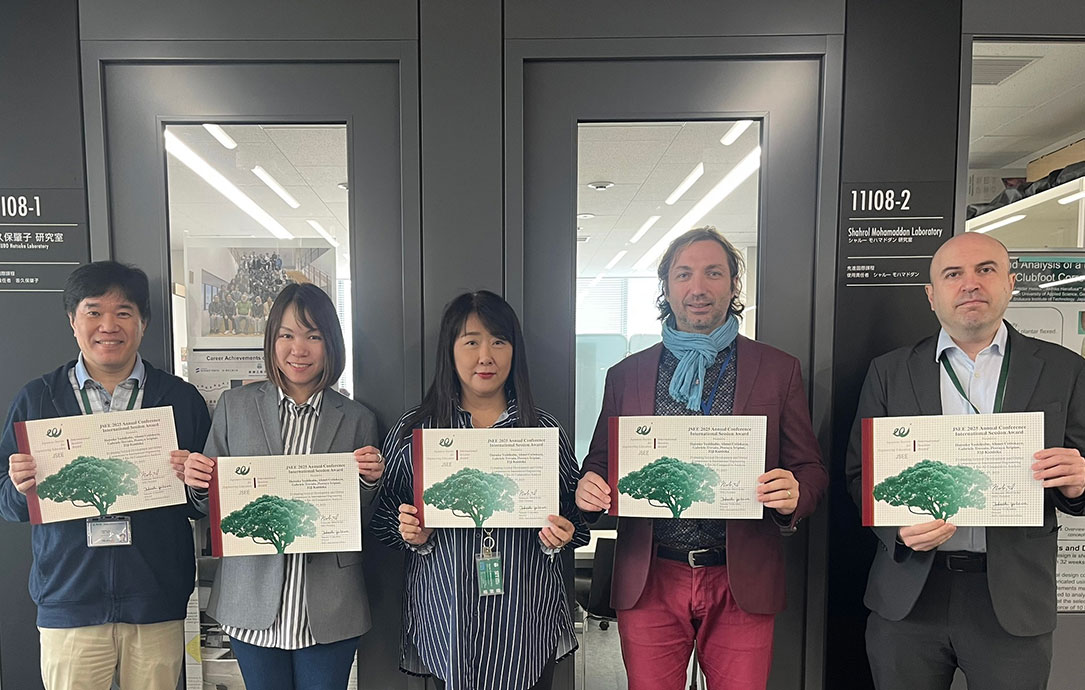吉久保肇子教授、Ahmet Cetinkaya 准教授、Gabriele Trovato 准教授、Peeraya Sripian 准教授、上岡 英史教授が第73回年次大会・工学教育研究講演会にて2025 International Session Awardを受賞
- 工学部

受賞者
大会名
賞名
発表題目
研究内容
本学では、「グローバル・コンピテンス(国際的課題対応力)」を備えた技術者の育成を教育の目標の一つとしています。本研究では、工学部カリキュラム内の英語(English-Medium Instruction: EMI)による人文科目を履修する留学生を対象に、英語語彙力の発達とグローバル・コンピテンスの関係を評価しました。生成系AI普及前の2022年度の課題データを分析した結果、語彙力は有意に向上し、語彙成長とグローバル・コンピテンスとの相関には正の傾向が見られました。
One of the stated goals of Shibaura Institute of Technology (SIT) is to foster engineers with 'global competence'. 'Global competence' refers to the ability to address the sorts of complex and multifaceted challenges that engineers will encounter in their professional careers within the context of an increasingly globalised society. This study evaluated the relationship between English vocabulary development and global competence among international engineering students enrolled in an interdisciplinary, English-Medium Instruction (EMI) humanities module within the engineering curriculum at Shibaura Institute of Technology. The student writing assignment data analyzed in this study were collected in 2022, before the widespread adoption of generative AI, and the statistical findings therefore reflect a pre-AI educational environment. English-language vocabulary proficiency, measured by the CEFR-based Vocabulary Level Analyzer (CVLA) developed by Prof. Uchida at Kyushu University, displayed a statistically significant improvement over the semester. The correlation between vocabulary growth and global competence, as quantified by the Miville-Guzman Universality-Diversity Scale–Short Form (MGUDS-S), was positive but not statistically significant.
研究目的
本研究では、九州大学の内田教授が開発したCEFRに基づく語彙分析ツール(CVLA)と米コロンビア大のProf. Mivilleが開発した異文化コンピテンス調査票(MGUDS-S)を用いて、学期初期と学期末のライティング課題とグローバル・コンピテンススコアを比較し、多文化的なEMI教室における体系的なライティング課題の提出と批判的思考の訓練が、国際工学系学生の言語的成長、論理的思考力、創造性、グローバル・コンピテンスの発達にどのように寄与するかを探りました。
The purpose of the study was to quantify the relationship between English vocabulary development and global competence, with both being classified as key learning outcomes for international students enrolled in an English-Medium Instruction (EMI) humanities module within the engineering curriculum at Shibaura Institute of Technology. The humanities course in question, titled 'History of Japan', adopts an interdisciplinary approach that integrates humanities, philosophy, and engineering perspectives. The study also analysed the effect of EMI instruction itself on participants' English vocabulary levels, with writing exercises being used as one of the main modes of instruction. The course participants included students from Europe, Asia, and South America, and as such class discussions drew from diverse viewpoints; a stated aim of the course design was to encourage this type of intercultural dialogue. By comparing students’ early and final essays using CEFR-based vocabulary analysis, the research explored how systematic writing practice and critical engagement in a multicultural EMI classroom could catalyse participants' linguistic growth, and promote logical thinking, creativity, and the development of global competence.
今後の展望
近年、日本の大学では英語による授業(English-Medium Instruction: EMI)が拡大していますが、特に理工系カリキュラムにおいて、学生の語彙力が異文化理解に与える影響を定量的に検証した研究はまだ多くありません。本研究結果は、言語発達の評価が異文化理解の深化とも密接に関係している可能性を示しており、異文化間で倫理的かつ効果的にコミュニケーションできるグローバル志向の技術者を育成するという日本の工学教育の目標に資するものです。今後は、この成果を踏まえて授業内容や評価方法をさらに改善し、より多文化的で実践的な学びの場づくりを進めていきます。
Despite the recent expansion of English-Medium Instruction (EMI) programs in Japan, limited quantitative research has examined EMI's impact on students' English proficiency and intercultural awareness - particularly in the context of science and engineering curricula. By addressing this gap, the present study contributes to society by providing insights into the effectiveness of current pedagogical approaches in Japan, and contributes to the move towards more comprehensive, fine-tuned assessment practices in EMI education. The findings emphasize the importance of evaluating language development and shed light on how this can be linked to greater intercultural understanding. As such, this research contributes to the goals of Japanese engineering education by fostering globally minded engineers capable of communicating ethically and effectively across cultures.